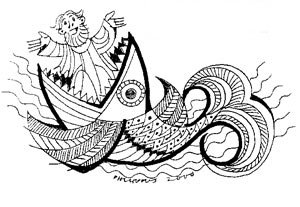

Federal Court of Appeals hears Arguments for Platte, Gilbert and Hudson.
The appeal of the sabotage convictions of Sisters Ardeth Platte, Carol Gilbert and Jackie Hudson was conducted this morning before a 3 judge panel of the federal 10th Circuit , Anderson , Hartz and Tymkovich.
A good crowd of 30 or so supporters were present in the courtroom. The consensus among the attorneys and the supporters of the Sisters was that the tilt of the judges questions seemed to favor the defendants by a margin of 2 to 1 or so.
Susan Tyburski introduced all three of the grounds for appeal. (see below ) 1. That the government did not prove the element of specific intent to harm the defense of the United States. She elaborated on the specific intent issue stating that Judge Blackburn did not correctly advise the jury of the need of the government to prove what specific intent would mean in this case.
2 Cliff Barnard made the argument that the government and the judge did not provide the jurors with a clear definition of what 'harming the national defense' would be in this case and did not distinguish the elements of a charge of "damaging property" from the elements of "harming national security" . Judge Anderson and judge Hart zeroed in on this point in questioning attorney Barnard and later the prosecution attorney. Barnard pointed out that there was a 5 point delineation of the definition of this offense in the Goren case and that the government had only taken one of those points into question to substantiate their definition. Judge Hartz questioned the government with "So the fact that this was a protest case is what made it sabotage and only damage done in a protest case can rise to the level of sabotage". The prosecutor had admitted that if a farmer had done the same amount of damage because he wanted the fence out of the way for some reason that that would not be sabotage even if the same level of security forces responded (helicopters, dozens of troops and multiple vehicles). This assertion seemed to trouble all three judges. It is impossible to know if they were only playing devil's advocate or if they really were troubled by this assertion.
3. Scott Poland made the argument that a good faith jury instruction should have been given to the jury. To wit, that the Sisters passionately believed in the International law that they argued for in a way severely limited by the judge. He had a colloquy with judge Anderson on this point. Anderson noting that the judge had indeed allowed some testimony on this point and "wasn't that enough for the jury
to consider in their deliberations?" Poland agreed there had been some
such testimony but that without the "tool" of a good faith instruction the jury had no guideline under which to consider such evidence. Judge Tymkovich pursued this point with the prosecution when he asked "suppose the defendants really held the belief that International Law is incorporated into the Federal Statutes?" The prosecutor made some reference to the fact they could not possibly hold that belief in "good faith".
This is only a brief summary of some of the main points made. The
decision will probably cone down in 3 months or so. Many who attended
found it more interesting than they had anticipated. All agreed that our side's attorneys had done an excellent job and were ready for the judges' questions.
There were a number of media present in court and they talked with the attorneys later outside the court house.
Bill Sulzman
Citizens for Peace in Space
P.O. Box 915
Colorado Springs, CO 80901
719 389 0644